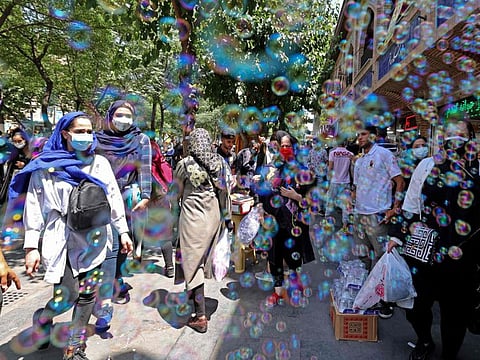Iran’s COVID-19 cases pass three million mark
Daily cases and deaths continue a downward trend ahead of a presidential poll on June 18

Tehran: Iran’s confirmed COVID-19 cases surpassed the three million mark on Thursday, the health ministry said, while daily cases and deaths continued a downward trend ahead of a presidential poll.
The Islamic republic, battling the Middle East’s deadliest coronavirus outbreak, is preparing to hold its presidential election on June 18.
The country has been struggling since late March to contain its “fourth wave” of Covid-19 blamed on a surge in trips made during Persian New Year Holidays.
Tehran has pinned hopes on vaccinations to help combat the health crisis, but the rollout of its innoculation campaign started in early February has progressed more slowly that authorities had wanted.
In the past 24 hours, the country officially recorded 12,398 new cases of infection, the health ministry announced.
Iran also recorded an additional 153 coronavirus-related deaths, it said, bringing the total to 81,672.
Daily infections and fatalities have been on a downward trajectory since their peaks of 25,582 on April 14 and 496 on April 26, respectively.
Iran's vaccination campaign
* Iran started its vaccination campaign using Russia’s Sputnik V jab in early February, and later imported a limited number of AstraZeneca/Oxford vaccine, delivered via the Covax vaccine-sharing programme. * Tehran has also received shipments of China’s Sinopharm and India’s Covaxin. * The Islamic republic has given over 4.2 million Iranians their first vaccine dose and only 742,817 their second, the health ministry has said, amid shortages that have delayed the vaccination drive. * The southern province of Fars, for instance, stopped its inoculation programme from Sunday over the "depletion of vaccine shipments”, IRNA said. * National virus taskforce speaker Alireza Raisi confirmed the shortage and said new shipments were expected next week. * Iran has five homegrown vaccines that are currently undergoing clinical trials. * The first, dubbed COVIran Barakat and funded by a state-run conglomerate, started trials more than five months ago and is expected to be publicly available by June 22, Alireza Raisi said. * Iran says its arch enemy the United States has hampered its access to vaccines through a tough sanctions regime, with international banks tending to refuse transactions involving Iran even through food and medicine are technically exempt.
Election campaigning, initially a cause of concern for spreading the virus, kicked off in late May with little fanfare and much of it taking place on social media.
But ultraconservative candidate Ebrahim Raisi, who is seen as the frontrunner, delivered a speech during a rally at a packed stadium in southwestern Iran late Wednesday, drawing criticism for not observing health protocols.
State news agency IRNA said “more than 50,000” people attended the event at Ahvaz city’s Takhti football stadium, filling the seats and the field itself.
“Not observing social distancing and health protocols was very evident at the event,” it said.
Vaccine shortage
Health officials have warned of signs that the recent drop in virus numbers might be reversed as Iranians drop their guard.
“The drop in infections has either slowed or stopped in some provinces due to residents not observing health protocols,” health ministry spokeswoman Sima Sadat Lari said on Sunday, when daily infections had hit a more than five-month low.
“This can be a serious cause of concern,” she added.









